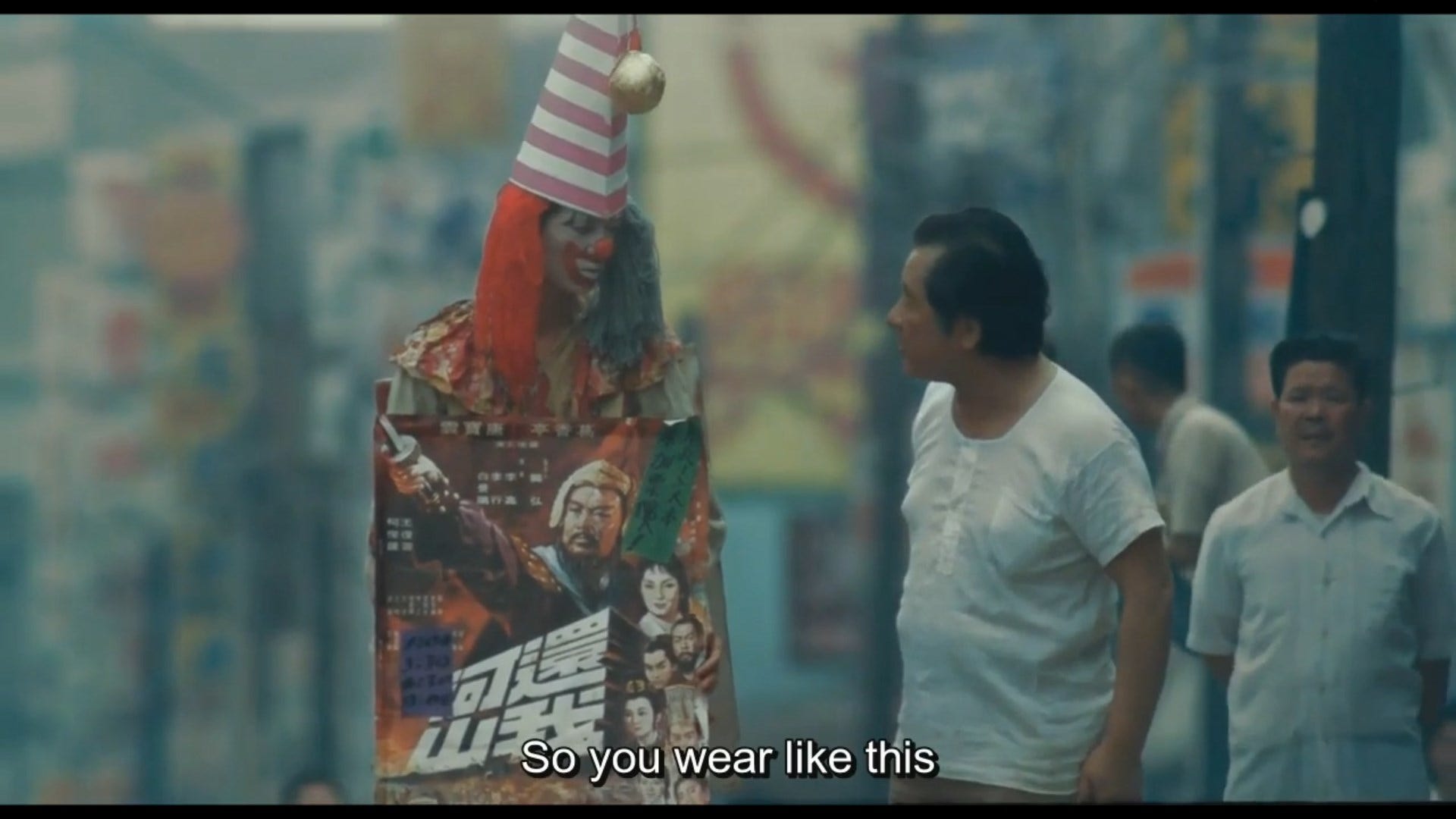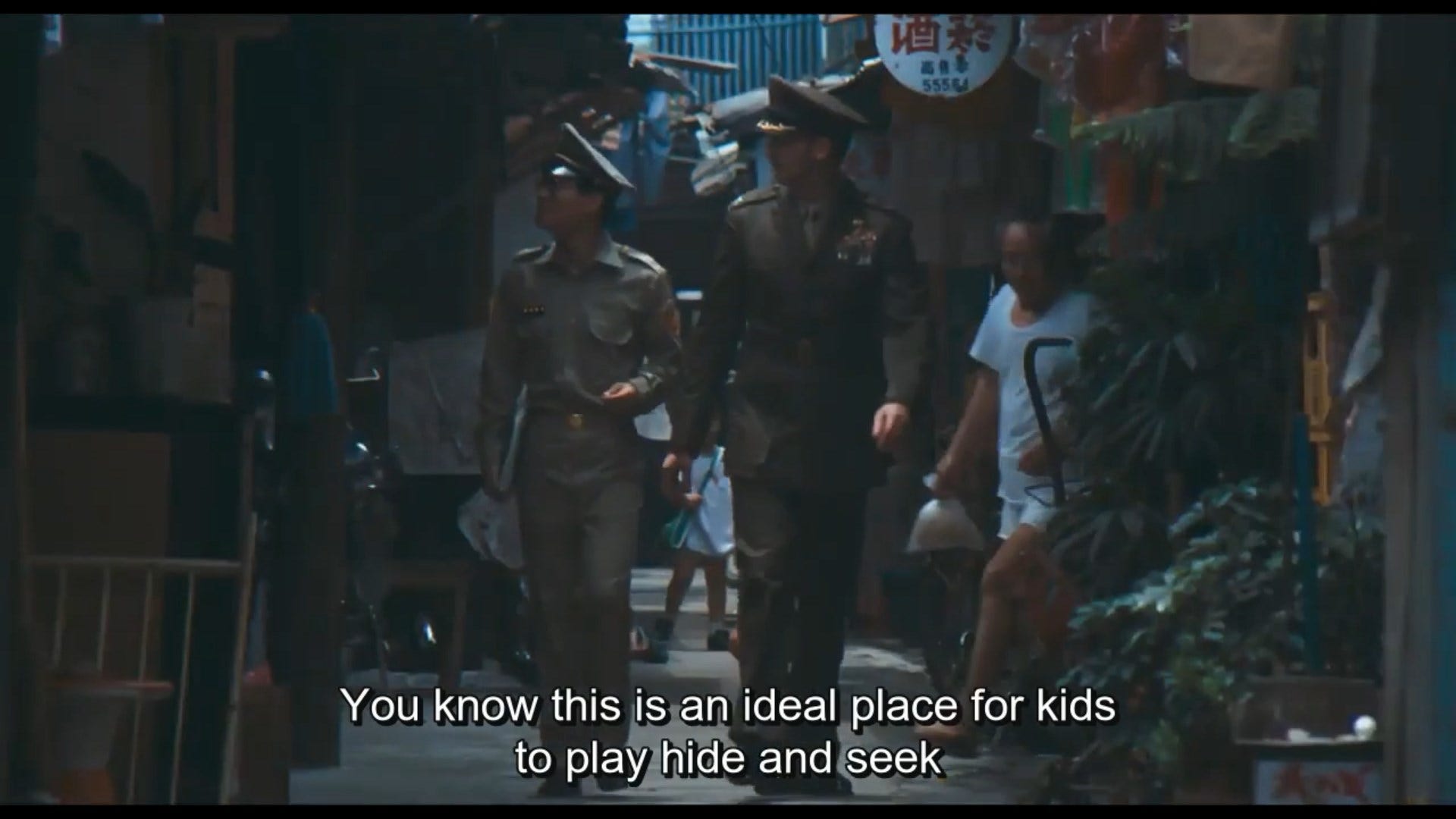Sandwich Man
30 9月 2023
so i watched this anthology of three shorts about taiwan during the latter half of the cold war. i didn't expect much from it because it's considered the beginning of the Taiwanese New Wave, a film movement that marries the formalism of the french new wave with an eye for kitchen sink realism, but i ended up enjoying all three shorts more than i anticipated.
they're easy to watch without much context of the history (though it would certainly help) and i would love for people to watch this because it's extremely sad and amusing at the same time. while there are parts that don't work for me, it's an expressive set of shorts that speak about taiwanese history and culture then and now.
i personally jive with it because i often connect history and geography to the media i check out. and well, this movie (and the Taiwanese New Wave movement) is conscious of that!
The Sandwich Man/The Son's Big Doll

the titular short directed by the guy behind A City of Sadness is about a guy who dresses up as a clown to advertise for a film theater. unfortunately, this advertising sucks and he gets bullied by the neighborhood for his outrageous costume. he however has to stick with it in order to feed for his newborn child and spouse.
what i like about the movie is that, despite the protagonist being a literal clown, it shows the hardships of an impoverished family feeding off rice rations. he works for his son the most (hence the big doll title) and yet, his success is very mixed. the guy doesn't know how to read, so he stumbled upon this job as a clown through some ingenuity of his own. and when he tries to be some patriarch, he comes off as pathetic and whiny. the movie sympathizes with the spouse instead who has to do everything for him.
it's also a gorgeous short depicting rural taiwan in both its beauty and flaws. people are moving in and out of this area, so it's not exactly decaying. but it's simply a big village with few jobs. there's homeliness to be found for sure, but there's also a sense that the situation will never improve.
i won't say too much about the ending. but it sure made me think "wow, this is ozu if he made a Twilight Zone episode". while i like the other two shorts, this short is kinda the highlight for the anthology because of this crazy ending. i seriously love it.
Vicki's Hat

two salesmen are sent to a village to sell imported japanese thermos pots. one is a thirty year old man who's trying to make enough money in order to take care of his expecting spouse while the other is a 20 year old who's worked with the army as an engineer and is just taking the job to leave his family. their salesmanship has not seen any successes and all they can do is think about how to sell all these goddamn pots.
i found this movie rather interesting because it's another angle on rural taiwan, but it's one that i actually have seen before. if the previous short is about stagnation, this presents a rural taiwan that's self-sufficient enough to be closed off to the world. the short can be read as two people trying to introduce technology that could ostensibly improve the lives of the people here, but there's no need for them to save time on cooking. in one scene, an old guy even questions the taste of the food if it's cooked that quickly.
i do like what the short is mostly doing, but there's also a part that makes me go uhhh. the 20 year old guy is for some attracted to an elementary school girl and the 30 year old even jokes about the "10 year plan" that he has to marry her and settle down in this rural area. i get what it's trying to do considering the ending, but that's definitely the lowest part of the the entire movie for me.
that said, the ending rules and is a great example of epic luddism. there's some obvious commentary on how japanese colonialism worked on taiwan too, though i remain unfamiliar with this side of history. despite that strange part i mentioned, i really liked what the short is trying to tell and how authentic its depiction of rural taiwan is.
The Taste of Apple

of the three shorts, this one has actual historical significance because it's invited a lot of controversy. this short depicts a traffic accident in the 1960s between a us colonel of the marines stationed in taiwan and a laborer from the countryside. the us colonel and his translator have to go through an actual illegally built slum district in order to provide compensation to the laborer's family who turns out to be quite big and poor.
this realistic depiction pissed off some conservative critics who begged the taiwanese state to censor this section because it would hurt the national image of the state as the movie's being sent to film festivals all over the world. what happened instead is that it promoted healthy discourse on censorship and realism. this incident is likely the impetus of the taiwanese new wave.
as for the short, it's a romp. it presents real poverty with unbelievable sympathy, but it also makes a mockery of the urban life and later the americans. this family is so poor that they are shocked by the us navy hospital they entered to visit their father. i was laughing throughout the entire short and i personally enjoyed this one the most, even more than the acclaimed titular short. there's something wonderful about seeing the "modern" lifestyle and riches through the lens of poverty. everything most people take for granted (like using western toilets) is alien to them and they make comedy out of it. what i really appreciate about the comedy is that it isn't mocking them, it's mocking us the audience who's familiar with this stuff. this impoverished family is just sincere and honest about their confusion.
the ending is really interesting. on one end, it feels like a classic comedy from the 40s where everything turns out all okay in the end. but the short also feels ironic: the poverty taiwanese people experienced could simply be erased by actual monetary support. this family is simply lucky, but it doesn't have to be that way.
in conclusion, the anthology has some rough edges, but it's perfect when it comes to exploring The Taiwanese Experience. i admire how the three directors have approached Taiwan as a subject matter in their own unique ways and their adherence to realism, despite some melodramatic elements, is awesome.
i've been thinking about how to write more stories based on social, economical, and political realities and i think this anthology has provided me some ideas on how to begin. this movie uses beautiful composition and other formalistic techniques to bring out the lived experiences of taiwanese people. it's a kind of arthouse kitchen sink realism that i really adore. for that and more, this movie is definitely worth watching.